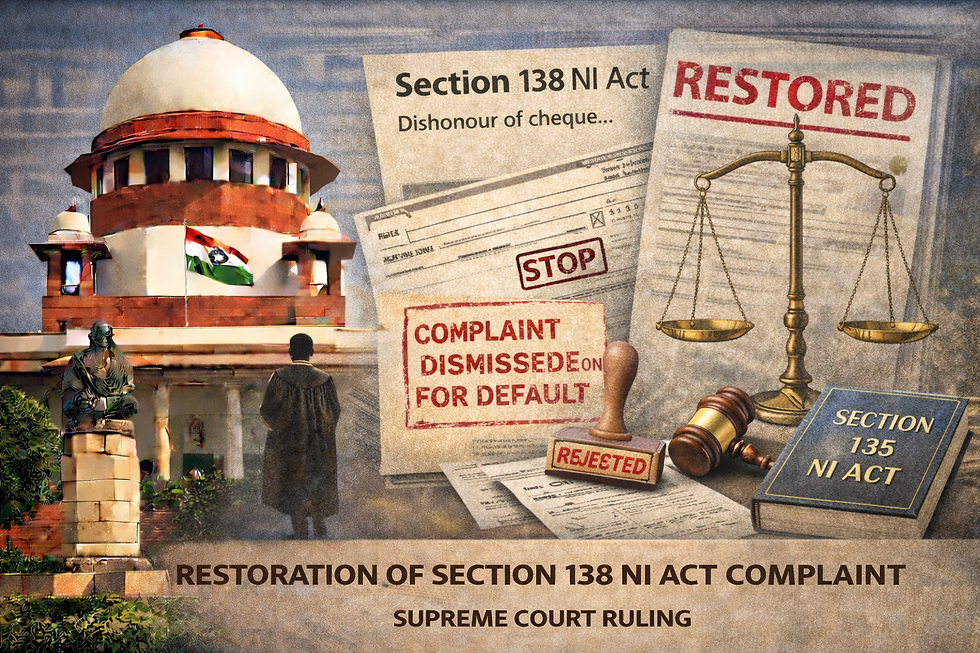A Lawful Agreement in Writing: Supreme Court's Landmark Judgment on Valid Compromises and Property Rights
- Chintan Shah

- Jul 17, 2024
- 4 min read
Updated: Jul 18, 2024
Summary of the Judgment
Case Name: Amro Devi & Ors. v. Julfi Ram (Deceased) Thr. Lrs. & Ors.
Date: 15th July 2024
Judges: Honorable Justice Vikram Nath, Honorable Justice Prashant Kumar Mishra
Acts and Sections: Code of Civil Procedure, 1908 (Order XXIII Rule 3, Order XXIII Rule 3A, Order 43 Rule 1-A, Section 52) Transfer of Property Act, 1882 (Section 52) Indian Contract Act, 1872 (Relevant to Explanation in Order XXIII Rule 3)
Cited Judgements: Gurpreet Singh v. Chaturbhuj Gopal, AIR 1988 SC 400 Thomson Press (India) Ltd. v. Nanak Builders & Investors (P) Ltd., (2013) 5 SCC 397 Som Dev v. Rati Ram, (2006) 10 SCC 788
Introduction
The judgement in the case of Amro Devi & Ors. v. Julfi Ram (Deceased) Thr. Lrs. & Ors. delivered by the Supreme Court of India on 15th July 2024, addresses critical issues of civil procedure, property rights, and the doctrine of lis pendens. The case provides a comprehensive analysis of the requirements for a valid compromise under Order XXIII Rule 3 of the Code of Civil Procedure (CPC) and examines the implications of such compromises on property transactions. This article delves into the nuances of the case, highlighting key points and judicial observations.
Background of the Case
The dispute began with a suit filed by Mansha Ram and others on 27th December 1979 for a declaration and permanent injunction concerning a piece of land measuring 7 kanals 9 marlas. The defendants, Julfi Ram and others, claimed tenancy rights over the land. The Trial Court ruled in favour of the plaintiffs, granting them both the reliefs sought. However, this decision was overturned by the first Appellate Court following a settlement between the parties. Subsequently, the High Court dismissed the second appeal, leading to the present case before the Supreme Court.
Key Issues and Judicial Reasoning
The primary issue before the Supreme Court was the validity and effect of the alleged compromise order dated 20th August 1984. The appellants contended that the sale deed executed in their favour was not impacted by the doctrine of lis pendens and argued that the alleged compromise was not in compliance with the procedural requirements of Order XXIII Rule 3 CPC.
Validity of the Compromise
Honorable Justice Vikram Nath and Honorable Justice Prashant Kumar Mishra scrutinised the alleged compromise. According to Order XXIII Rule 3 CPC, for a compromise to be valid, it must be a lawful agreement or compromise in writing, signed by the parties, and proven to the satisfaction of the court. The Court noted:
"In the present case, there is no document in writing containing the terms of the agreement or compromise. In the absence of any document in writing, the question of the parties signing it does not arise."
This lack of a written and signed document led the Court to conclude that the compromise order did not meet the legal requirements and thus, could not be considered valid.
Impact of the Doctrine of Lis Pendens
The doctrine of lis pendens, encapsulated in Section 52 of the Transfer of Property Act, 1882, posits that any transfer of property during the pendency of a suit is subject to the outcome of the litigation. The respondents argued that the sale deed in favour of the appellants was void due to this doctrine. However, the Court cited the judgement in Thomson Press (India) Ltd. v. Nanak Builders & Investors (P) Ltd., which states:
"Transfer of suit property pendente lite is not void ab initio, as it remains subservient to the pending litigation. The purchaser of any such property takes the bargain subject to the rights of the plaintiff in pending suit."
Applying this principle, the Court observed that the sale deed dated 22nd August 1983 was not nullified by the doctrine of lis pendens.
Res Judicata and Collusion
The concept of res judicata was also pivotal in this case. The first Appellate Court's decision was based on the statements made by the parties indicating a settlement. The Supreme Court highlighted:
"The Trial Court had no occasion to comment upon the legality of the compromise because neither parties challenged the compromise decree by filing an appeal under Order 43 Rule 1-A of CPC. Thus, it operated as res judicata and could not have been re-opened in a subsequent suit."
The Court further addressed the appellants' conduct, indicating possible collusion and dishonesty, which tainted the legitimacy of the alleged compromise.
Relevant Judicial Observations
The judgement extensively quotes and relies on precedents to substantiate its conclusions. The Court noted:
"For a valid compromise in a suit there has to be a lawful agreement or compromise in writing and signed by the parties which would then require it to be proved to the satisfaction of the Court."
Furthermore, the judgement in Som Dev v. Rati Ram was highlighted to clarify the rigours of Order XXIII Rule 3 CPC:
"After the amendment of the Code of Civil Procedure in 1977, a compromise decree can be passed only on compliance with the requirements of Rule 3 of Order XXIII, otherwise, it may not be possible to recognise the same as a compromise decree."
Conclusion
In its final judgement, the Supreme Court allowed the civil appeal, setting aside the orders of the High Court and the first Appellate Court, and confirmed the Trial Court's decree dismissing the suit. The ruling emphasised the necessity for strict adherence to procedural requirements for compromises under Order XXIII Rule 3 CPC, and clarified the application of the doctrine of lis pendens.
The case of Amro Devi & Ors. v. Julfi Ram (Deceased) Thr. Lrs. & Ors. serves as a crucial reference for legal professionals, elucidating the complexities of civil procedure and property law in India. It underscores the importance of written documentation in legal compromises and the impact of pending litigation on property transactions.



Comments